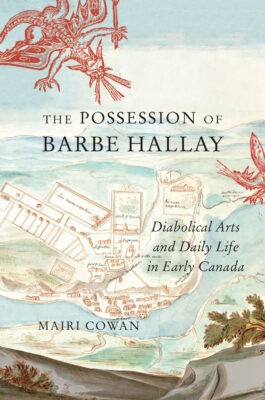It is always a treat to find a nugget of information in a history book that’s immediately applicable to a contemporary social or political issue, particularly so when that book is about the demonic possession of a seventeenth-century teenage girl.
In New France, they thought they could make a better France. To get there, the political leaders in France decided to implement “francisation,” a policy of assimilation that had at its core religious conversion to Christianity and cultural adaptation to at least some French norms.
Plus ça change.
I admit that I initially figured Mairi Cowan’s The Possession of Barbe Hallay would be a historical exploration of a New France version of the Salem witch trials. What it is, in fact, is a window into daily life in New France at a pivotal moment in the floundering colony’s history – the moment right before it transitioned into a French province and became more directly administered by France.
It is also a window onto a transitional point between the late medieval era and the early modern period, and a portrait of a painfully small, exceedingly superstitious society living in near-total fear of being wiped out – either by war, disease, or famine – at this moment of transition. How and why a community could become convinced of a teenager’s demonic possession can only be answered with a solid introduction to what life was like for the average person living in Quebec in the mid-seventeenth century.
Indeed, why local miller Daniel Vuil should be not only imprisoned, but then executed, for setting demons upon the young woman who rebuffed his marriage proposal is evidently not so straightforward, even if we ignore the fact that demons, witchcraft, and sorcery were common enough explanations for all that was otherwise inexplicable in the New World. What is unique about this case is that he would suffer such an extreme punishment for offenses not habitually worthy of execution – particularly not in a struggling colony.
The Possession of Barbe Hallay McGill-Queen's University Press
Diabolical Arts and Daily Life in Early Canada
Mairi Cowan
$29.95
paper
296pp
9780228014041
Cowan covers a lot of ground despite the relative paucity of available information on this specific event, providing a meticulous dissection of what sources are available, as well as inferring from those sources what we otherwise have no record of – such as what Hallay’s journey from France to Quebec City likely would have been like, and what the struggling outpost would have felt, looked, and smelled like upon her arrival.
Though there are aspects of Quebec’s latterday culture, society, and politics that are impossible to separate from the daily realities of the colonial evangelizing project of the seventeenth century, Cowan also amply demonstrates the extent to which that society doesn’t neatly fit the established narrative most of us would be familiar with. New France was not a uniform Catholic monoculture – Indigenous religions, Protestantism, folk beliefs, and even different approaches to Catholicism all competed with the official doctrines and aspects of faith used to enforce and control society. Though men were dominant – and demographically over-extended – women exercised considerable power in certain aspects of colonial life, particularly when it came to healing.
Cowan amply demonstrates a society far more complex – and with far greater depth – than we might assume, given the often narrow and superficial narratives used to gloss over more than two centuries of French colonial era experience in New France. The book stands on its own as an introduction to settler colonial life in the mid-seventeenth century, at roughly the halfway point in the evolution of the colony, and would make a fine history even without the narrative device of Hallay’s possession interwoven throughout, leading us through a unique chapter in our history.
Remarkably, the story of a teenager’s demonic possession makes the history more relatable to our present circumstances, as it helps illustrate the origins of the deeply ingrained siege mentality and wariness of outsiders so unfortunately present in contemporary Quebec society.mRb






0 Comments